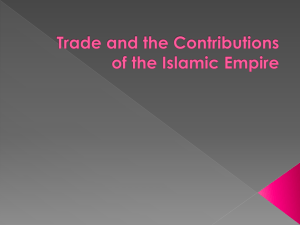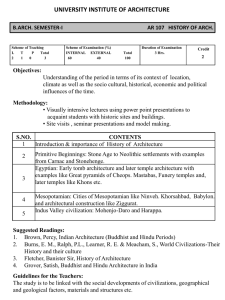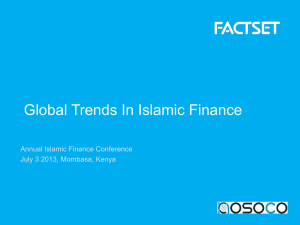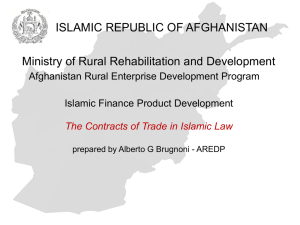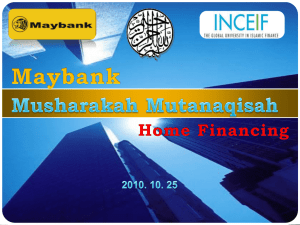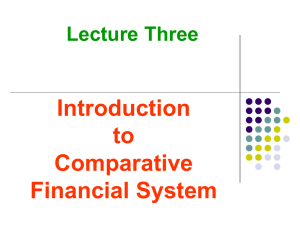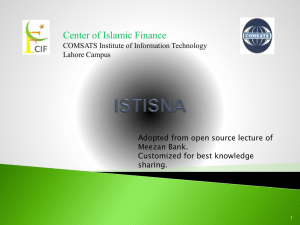Introduction to Non-Interest Banking
advertisement
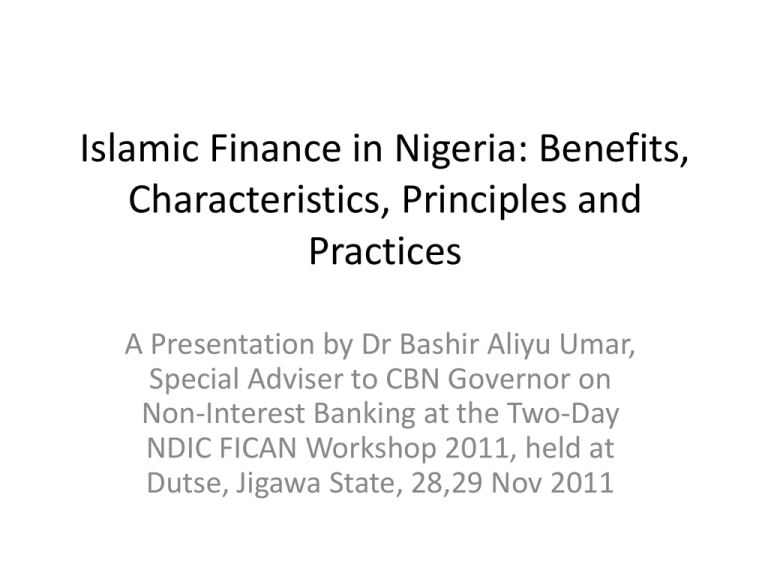
Islamic Finance in Nigeria: Benefits, Characteristics, Principles and Practices A Presentation by Dr Bashir Aliyu Umar, Special Adviser to CBN Governor on Non-Interest Banking at the Two-Day NDIC FICAN Workshop 2011, held at Dutse, Jigawa State, 28,29 Nov 2011 Introduction to Islamic Finance Definition: A financial system that offers products, services and financial instruments based on the Islamic law (Shariah) Components: Islamic Banking e.g. Ja’iz Bank, Stanbic IBTC NonInterest (Islamic) Banking Window Islamic Insurance (Takaful) e.g. Takaful windows in Africa Alliance Insurance Plc and Niger Insurance Plc, Halal Takaful, a division of Cornerstone Insurance Plc Islamic Capital Markets, e.g. Lotus Capital Plc and Halal Fund of ARM Intermediation in Conventional Banks Assets Liabilities Loan Saving/Investment Conventional Bank Borrower Interest Depositor Interest Intermediation by Islamic Banks Assets Liabilities Financing/Investment Client Mudarabah, Musharakah, Murabahah, Salam, Istisna, Ijara Deposit/Investment Depositor /Investor Islamic Bank Profit on sales, lease/Profit sharing/Commi ssions (agency, services) Gift/Profit Sharing Wadi’ah, Qard, Mudarabah, CMD Core Contracts in Islamic Finance • Murabahah (Cost-Plus Sale Contract) A Murabahah transaction is a sale at a stated profit. In a Murabahah transaction, the bank purchases something from a third party and sells it to the client at a stated profit on a deferred payment basis. In this way, the client can buy something without taking an interest-based loan. • Ijarah (Lease) An ijarah is an Islamic lease. The bank purchases an asset and leases it to a client for fixed monthly payments. An ijarah may include an option for the lessee to buy the asset at the end of the lease, though such a provision is not required. • Mudarabah (Silent Partnership) A Mudarabah transaction is an investment partnership. In a mudarab arrangement, the contract is between an investor (or financier) and an entrepreneur or investment manager known as the mudarib. Risk and rewards are shared. In the case of a profit, both parties receive their agreed-upon share of the profit. In the case of a loss, the investor bears any loss of capital while the mudarib loses his time and effort. Core Contracts in Islamic Finance • Salam (Forward trade Contract) It is a sale where the seller undertakes to supply some specific goods to the buyer at a future date that is specified in exchange of an advanced price fully paid at spot. This mode of financing is used to finance the agricultural sector. • Istisna’ (Partnership in Manufacturing) It is a mode of financing where the commodity involved is manufactured to the specifications of the purchaser. This is widely used in the housing finance sector, where the client seeks finance for the construction of a house. The financier may undertake to construct the house on a specified land either belonging to the client or purchased by the financier, on the basis of Istisna', with payment fixed in whatever manner the parties may wish. • Musharakah (Equity Partnership) This involves partners providing funds for a venture, with profits shared according to their invested capital, and the loss is borne by them in the same way. Main Differences between Islamic and Conventional Finance Characteristics Islamic Finance Conventional Finance Interest-based financing Interest-based financing with a fixed or floating rate of interest charged for the use of money. Interest-based deposits Deposits are interest-based and the investor and bank commit a predetermined rate of interest with a guarantee of principal payment. Interest paid to depositors by banks is less than the interest they charge on loans, the difference being the margin that the bank makes. Investment products Financing is not interest-based but is asset-backed and based on generating a profit from sale of an asset or its usufruct. Deposits are not interestbased but based on profit and loss sharing or as interest-free loans Banks get a share of the profit from the business venture to which it is a party, and in case of loss devoid of any negligence on the part of the bank, the investor forgoes the reward for the activity during that period Asset-backed investment products like Sukuk (Islamic bonds) and other shariahcompliant investment certificates. Interest-bearing securities like government bonds Main Differences between Islamic and Conventional Finance Characteristics Islamic Finance Equity Financing with Risk Sharing Penalty on Default Restrictions Prohibition of Speculation (Gharar) and Gambling (Maysir ) Conventional Finance Offers equity financing for a business or venture. Losses are shared based on the equity participation, while profit is shared based on a pre- agreed profit sharing ratio. No extra money is charged as penalty for payment default Dealing in unlawful goods and services like alcohol, pork, pornography prohibited Transactions with elements of gambling and speculation such as derivative trading are strictly forbidden. Conventional insurance is prohibited due to the element of uncertainty embedded in that contract Not generally offered but available through venture capital companies and investment banks. Normally they participate in management as well. Permissible charge for late payment or default. There are no such restrictions Trading in any kind of derivative/futures involving speculation is allowed. Conventional insurance is allowed. Main Differences between Islamic and Conventional Finance Characteristics Islamic Finance Conventional Finance Shariah Supervisory Board Islamic financial institutions are required to have a Shariah Supervisory organ appointed by the Board as part of its corporate structure to ensure that all business activities are Shariah compliant. There is Shariah audit in addition to financial audit There is no such requirement. Only financial audit Benefits of Islamic Financial Services on the Nigerian Economy • Financial market deepening: new market and institutional players will be introduced e.g. Islamic Money Market, Islamic asset management companies, Takaful, etc. • Financial Inclusion: a large number of Muslims in the country that had hitherto steered away from the organised conventional financial services due to their aversion to interest and interest-based products will be integrated in the formal economic sector, which will in turn lead to replacement of informal markets with formal and regulated ones. • Enhanced product offering from an array of asset-backed instruments of finance as alternatives and complements to the conventional ones. • New competition in the banking industry which is expected to engender a concomitant reduction of interest rates. • Enhanced oversight and regulation through an added component of corporate governance, which is the Shariah supervisory board/committee. • Enhanced investment in the critical sectors of the economy through the use of Sukuk, a new financing instrument. • Development of the real sector of the economy through its asset-backed financing which will avail funds only to production and real investment activities. Practice of Islamic Finance in Nigeria • Challenges – Asset Liability Mismatch and absence of Shariahcompliant liquid investment instruments • Activities in other jurisdictions, CM, Short-term Sukuk – Treatment of Profit Sharing Investment Accounts (PSIA) – Deposit Insurance – Tax treatment of Islamic finance products – Shariah Expertise Conclusion • Bracing up to the challenge Thank you

